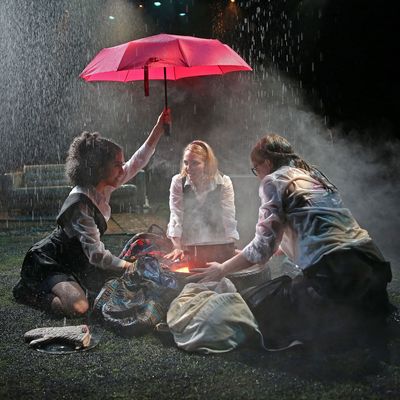
Shakespeare’s oeuvre is kind of like Twitter: a magnet for hot takes. And thank goodness that it is — there’s not another body of work in the English language so open to infinite re-authoring by other artists, so elastic and absorptive and yet, even in the most deadly productions, so inviolable at its core. What is dead may never die, but it can live again and again, and it’s always exciting when a director approaches a Shakespeare play with a real intensity and specificity of vision. Exciting, and sometimes frustrating. Because there’s commitment to a concept and then there’s commitment to the play, and for alchemy to happen, the two have to go hand in hand. In director and adaptor Erica Schmidt’s new rendition of the Scottish play — here, the title is broken up into Mac Beth—the stage is awash in concept, but the real, visceral stakes of the story at hand can be neither seen nor felt. Schmidt’s Mac Beth feels like a gilded picture frame with no picture in it. It’s eye-catching, sometimes even tantalizing, but there’s a big old doughnut hole in the middle.
The production comes with a hefty helping of dramaturgical perspective in its program, including an essay by Akiva Fox taking us back to May 31, 2014, in Wisconsin, when two 12-year-old girls stabbed their best friend 19 times as some kind of delirious tribute to the creepy internet character known as Slender Man. Inspired by this and other true stories of fantasy, weird fellowship, and violence among young women, Schmidt has adapted Macbeth into the story of seven teenage schoolgirls. In preppy uniforms (including tartan-lined Hogwarts-style capes), these girls meet after school in some derelict clearing, conveniently equipped with abandoned couch and clawfoot bathtub, to act out Shakespeare’s play. “An old man had a play in his lap,” says one of the first three girls to arrive, heavily paraphrasing a line by Macbeth’s First Witch. “‘Give me,’ quoth I — I’ll do, I’ll do, and I’ll do.”
We don’t know who these girls are or why they’ve gathered to recite this story (or a specialized, streamlined 90-minute cut of this story), but we sense their giddy intensity. Unfortunately, that’s pretty much all that we sense. Schmidt is so enamored of her big idea — these girls and the Slender Man–incident–esque real violence that we can tell from the beginning will eventually bubble up out of the pretend violence — that she allows her actors to gallop through the text of Macbeth as if it has nothing to offer but basic structure and forward motion. Though they’re full of gutsy, sometimes appealingly wacky energy, the seven actors are so caught up in channelling frenetic teenagedom that the characters they’re enacting inside Shakespeare’s play blur together, a mess of casual, hyper, contemporary gestures that never let us take the story seriously.
And we need to take the story seriously — otherwise, why are we all here? If we’re to believe that the game these girls are playing will ultimately turn deadly, then we’ve got to feel the stakes of it. The play they’ve chosen has to be a kind of seance, a ritual that conjures up forces beyond the control of the conjurers. A spell isn’t simply words: It’s words and intention, words and deep, ferocious desire. As Lady Macbeth, Ismenia Mendes comes closest to tapping the story’s dark, frightening heart. She’s working hard to find both the girl in knee socks and the ambitious, desperate, carnal woman inside her, and there’s real hunger in the way she clings to Isabelle Fuhrman’s furrow-browed Macbeth. But Mendes, in her most connected moments, is in one play and Fuhrman and the rest of the cast are in another. Along with Ayana Workman’s Banquo and Lily Santiago’s Macduff, Fuhrman trots through her lines with clarity and energy but without depth of feeling. They’re not living the story; they’re playing the frame. The production seems to bank on its knowing, relatively light tone to make the inevitable gory twist more powerful, but in fact, after 80 minutes of low stakes, the play is hobbled, and the twist lands not with a harrowing echo but with a predictable thud.
It’s the witches (Sharlene Cruz, Sophie Kelly-Hedrick, and, in the show I saw, Izabel Mar stepping in for Annasophia Robb) who engineer the climax of Schmidt’s adaptation — and perhaps the whole of it — and they too live in a world of approximated teenage volatility rather than real menace or specificity of character intent. Of the three, Kelly-Hedrick’s staring, slack-jawed, Ring-Pop-sucking Witch 2 has the most distinctive, genuinely creepy presence. But follow the arc of her and her sisters at a little distance, and the production’s logic shrinks the story. When the trio breaks bad, it seems obvious that, like the girls in Wisconsin, they’ve had their master plan in mind from the beginning. Which means that Mac Beth isn’t a tale of possession-by-play but of play as means-to-an-end — a flatter, less evocative scenario. Either way, though, the play is still the thing: It’s necessary because it and only it contains the dark power that the girls need to make the firstlings of their hearts the firstlings of their hands. But Schmidt has her actors playing around Macbeth, not actually doing it. Dance parties and selfies, used tampons and Solo cups of cheap wine, color-guard flags and Ziploc baggies of bloody cauldron ingredients (purloined from “the science lab”) are, in the end, only so much window-dressing. And the shame of it is, they could be more. It’s undeniably exciting to hear the words of Macbeth resonating from the bodies of seven young women. Schmidt’s big idea holds water, but without the force and feeling of the play it’s wrapped around, it can’t hope to grab us by the throat.
Mac Beth is at the Lucille Lortel Theatre through June 9.


